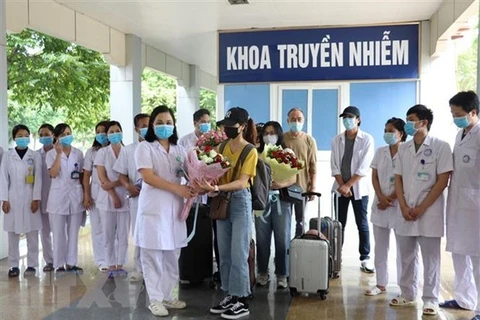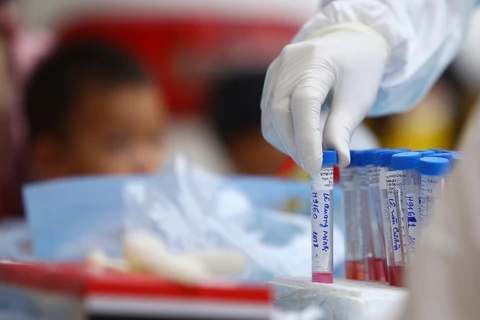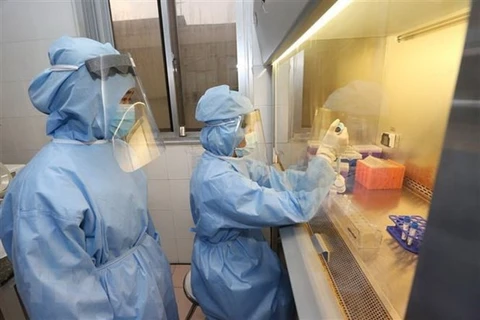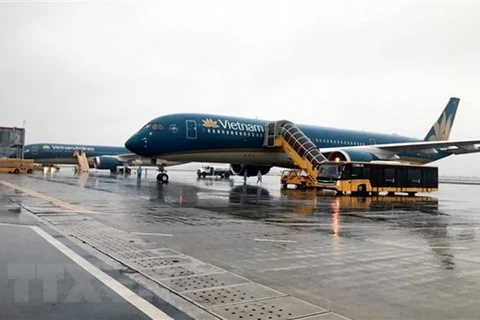 Since the coronavirus outbreak began in HCM City, every day has been a busy one for health workers at Emergency Centre 115. (Photo: VNA)
Since the coronavirus outbreak began in HCM City, every day has been a busy one for health workers at Emergency Centre 115. (Photo: VNA) HCM City (VNS/VNA) — Since the coronavirus outbreak began in HCM City, every day has been a busy one for health workers at Emergency Centre 115.
In addition to transporting emergency patients to health facilities, they have been assigned a new task: transporting COVID-19 cases and those suspected of having coronavirus to health facilities and quarantine areas.
Medical staff at the centre are working harder than ever despite rising temperatures in the city.
They have become the "silent transporters" in the fight against the disease.
Dr Do Ngoc Chanh, the centre's deputy director, said since the end of December 2019, Emergency Centre 115 had been preparing plans to cope with the pandemic after reports started filtering from across the world.
"We were one of the first units in Vietnam to prepare a response plan because we were aware that HCM City was at high risk. Everything had to be prepared early," Chanh said.
On the 29th day of the last lunar month of the Year of the Pig (2019), the first two COVID-19 cases appeared in Vietnam and in HCM City.
Since then, the entire centre has been put on "red alert".
Dr Dao Thi Bich Hang, acting head of the centre's Administration Department, said on the second day of the Lunar New Year, they received a phone call from a resident reporting a tourist suspected of being infected with the SARS-CoV-2 virus in District 3.
A team from Emergency Centre 115 fully prepared protective gear and rushed to the scene.
“To be honest, at that time, we still had not received instructions on how to investigate the virus, so when someone called to report suspected infections, we prepared protective clothing before approaching patients," said Dr Hang.
The team on duty that day were concerned, and their fears were only allayed when doctors at the Hospital for Tropical Diseases reported that the tourist did not have coronavirus, she said.
On January 31, the centre received a call from a hotel reporting that a man from the US who had passed through Wuhan Airport was showing symptoms of the disease.
He was promptly treated and isolated to avoid spreading the disease, Dr Do Ngoc Chanh said.
Since then, the staff at the hospital have had many sleepless nights and unfinished meals.
Vo Lam Khoi Nguyen, a driver, said he was disinfecting his car after each trip, and was always on call.
Even at 11pm, the phone was still ringing non-stop for the drivers to pick up patients or suspected cases to health facilities, and sometimes they were returning home at 5am.
Another new day began after a sleepless night.
Hundreds of such trips have taken place during the COVID-19 pandemic.
“I have experienced many pandemics but this is the most stressful, especially with people coming from abroad. Sometimes we have to transport 7-8 COVID-19 patients and suspected cases a day, not including daily emergency cases," said Pham Quoc Viet, head of the team, who has worked at the centre for nearly 30 years.
It takes 5-6 hours for each trip because the quarantine sites are far from the city, he said.
“Drivers are not allowed to rest along the way when they are transporting patients or suspected cases to hospitals or quarantine zones. We have to leave our personal needs behind," Viet said.
The protective clothing, mask and gloves in cars without air conditioning makes it tougher.
"It's like torture," Nguyen said with smile.
That's the job. They all work hard to fight the pandemic.
The phone rings and they're off again./.
VNA
























